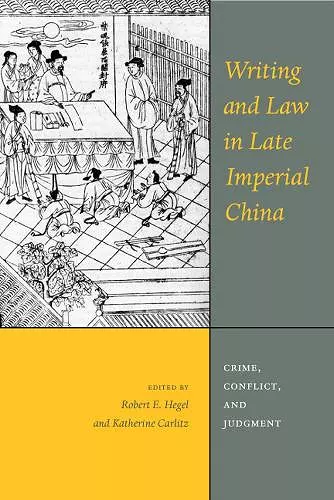Writing and Law in Late Imperial China
Crime, Conflict, and Judgment
Robert E Hegel editor Katherine N Carlitz editor
Format:Hardback
Publisher:University of Washington Press
Published:16th Jul '15
Currently unavailable, and unfortunately no date known when it will be back
This hardback is available in another edition too:
- Paperback£31.00(9780295989136)

Writing and Law in Late Imperial China makes an important contribution to Chinese legal history. Apart from the original research on which many of the essays are based, its turn to literary methodologies in the study of law yields not only new information about late imperial law in China, but new kinds of knowledge about it. -- Teemu Ruskola, American University
In this fascinating, multidisciplinary volume, scholars of Chinese history, law, literature, and religions explore the intersections of legal practice with writing in many different social contexts. They consider the overlapping concerns of legal culture and the arts of crafting persuasive texts in a range of documents including crime reports, legislation, novels, prayers, and law suits. Their focus is the late Ming and Qing periods (c. 1550-1911); their documents range from plaints filed at the local level by commoners, through various texts produced by the well-to-do, to the legal opinions penned by China's emperors.
Writing and Law in Late Imperial China explores works of crime-case fiction, judicial handbooks for magistrates and legal secretaries, popular attitudes toward clergy and merchants as reflected in legal plaints, and the belief in a parallel, otherworldly judicial system that supports earthly justice.
"[F]resh ways . . . to apprehend both legal writing and the ways in which such writing resonated with both popular cultural conceptions and the ideologically driven imperatives of the state. . . . Scholars using legal writing in their own research need to read this book."
- Bradly W. Reed (China Review International)"By treating law as literature, several essays bring methods of literary analysis to bear on legal materials and open up new questions for the study of law in China. By demonstrating the importance of narrativity and rhetoric in legal case records, these scholars do not dwell on how just or unjust was the system, but instead move the focus to how different historical actors adopted narrative strategies to pursue what were often divergent interests."
(The Historian)"I recommend this book in the strongest of terms. It makes an exceptionally important contribution both to the study of law and to the study of literature and their intimate and inextricable relations in late imperial China."
(Chinese Literature)"Writing and Law in Late Imperial China is a very substantial addition to the revived and now flourishing discourse on law, culture and society in late-imperial China. It cleverly extends our knowledge . . . . [and] points the way for future language and law research on imperial China."
(China Quarterly)"Will prove valuable and stimulating to the field of Chinese legal studies."
(Journal of Asian Studies)"The worth of the topic and its coverage here can hardly be over-stated. We are increasingly appreciating the Chinese interest—- literary as well as personally relevant—- in the law over the millennia. Indeed, Chinese fascination seems to transcend that in the West, because for many Chinese, disputes and their litigation begun during life might continue in the hereafter, not toward a remote Judgment Day, but toward concrete justice in an underworld tribunal."
(Journal of Asian HistISBN: 9780295996004
Dimensions: unknown
Weight: 671g
352 pages